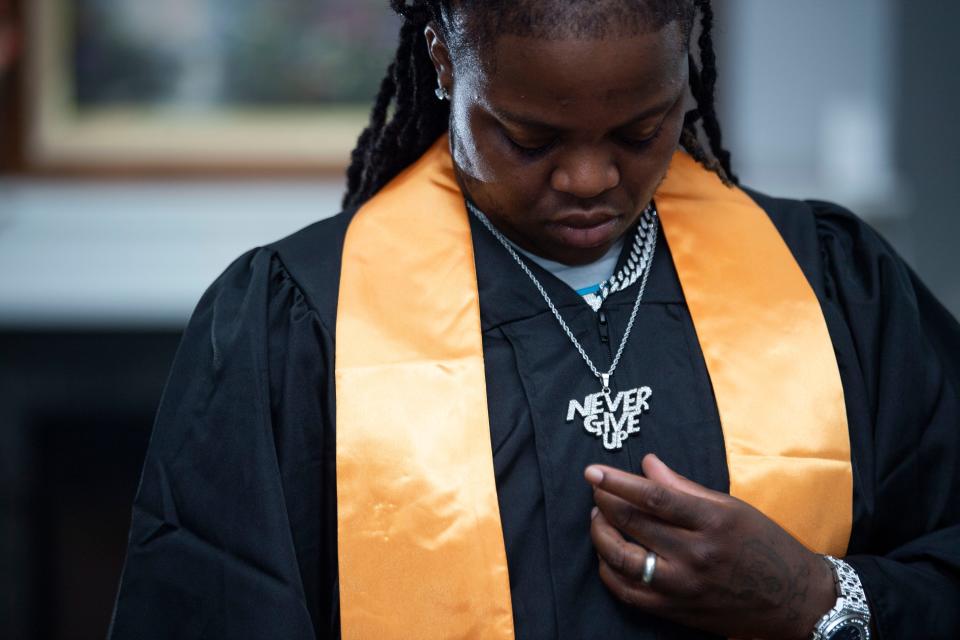'I can’t ever give up': Tennessee inmates overcome one obstacle after another for degrees
Da'maryious Dorsey and Miranda Jackson started community college braced for a challenge. After all, they were in prison.
Jackson, 38, had a GED diploma. When she considered college before, she’d thought, “This ain’t going nowhere. I ain’t going to finish this,” she said.
Dorsey, 30, “always felt like odds was against me,” he said. Growing up in North Memphis, he was on the honor roll and anticipated basketball scholarships. His grandmother, who raised him, preached the importance of education.
But at 17, instead of going on college trips, he went to prison. Women’s prison, with Jackson — Dorsey is a transgender man.

Locked up, both focused on improving themselves. Dorsey earned a GED diploma, a carpentry license and a peer recovery specialist certification. Jackson completed a nine-month substance abuse program. Then they both signed up for Dyersburg State Community College’s remote associate’s degree in business management.
“I got to climb higher. And the only thing I can do is education. Because prison, they don’t rehabilitate you. You have to rehabilitate yourself,” Dorsey said. "Treat a person as they are, and they will stay that way. Teach a person what they could be, and they will be transformed."
He had an entrepreneurial vision: a youth program where he’d teach life skills through basketball.
“I feel like people was put on this earth to help other people,” he said. “I don’t want people to look at me for who I am when I was 17. I want you to look at me for who I am today.”
Improving futures by the numbers
Why does prison education matter? Because all the evidence shows it keeps people from re-offending.
After analyzing four decades of data, the Rand Corporation concluded that inmate education reduces recidivism by 28%. Every dollar spent on prison education saves taxpayers $4 or $5 in the first three years alone. Not to mention the savings in grief and anguish.
In 2019, Tennessee prisons released more than 14,000 people, according to the Prison Policy Initiative. Recidivism is too common: As of 2020, about 46% of people released from Tennessee prisons were back behind bars within four years, according to the state Department of Correction.
Governments and nonprofits have gotten the message. Starting this fall, people in prison will be able to get Pell grants for community college tuition. Tennessee Gov. Bill Lee announced a prison college initiative in 2019.
The nonprofit Tennessee Higher Education Initiative has helped people earn degrees since 2011. So far, 103 of its participants have graduated, according to spokeswoman Rachel Zolensky. All have remained free.
A first-person account: How Tennessee higher education in prison changed my life
Studying behind bars
Prisons are designed for safety, not education. When Jackson, Dorsey and the other students in their cohort began the online college program, the barriers seemed like cinder block.
Sunday deadlines, when the prison students could use computers only on weekdays. Online research assignments and lectures on YouTube, when the prison students weren’t allowed to get on the open internet.
A guard had to supervise them in the computer lab, and the prison was short-staffed. Some days, the class would get together as a group and ask a guard to open the school building, saying, “We want to get to our education.”
Nonetheless, they hustled.

“How I treat life is like an obstacle course,” Dorsey said. “If I’ve got to jump, I’ve got to jump. If I’ve got to slide, I’ve got to slide."
After doing her prison job, Jackson would close her ears to the racket of 128 inmates and write down answers she’d later type up.
To do research, someone in the cohort would call a relative and ask them to Google a topic and relay the results over the phone. Then they’d share the information with the others.
“We had to depend on each other, and we weren’t leaving nobody behind,” Dorsey said.
Dyersburg State administrators acknowledge there was a learning curve. The college had offered prison education before, but only two classes per semester, and professors went to the prisons, said Andrea Franckowiak, head of Dyersburg State’s correctional education program. Online, full-time “was a brand-new everything for everyone,” Franckowiak said.
The students told their professors about the challenges. In response, they adjusted deadlines. Accounting professor Wayne Corlis opened all the assignments so students could work at their own pace.
He was Jackson’s favorite professor. He was “very encouraging. He just wanted us to strive,” she said.
Partway through, Tennessee Higher Education Initiative staff stepped in to add support. For Jackson and Dorsey, that felt like the turning point. “Thank God for THEI,” Dorsey said. “It wasn’t a week later we were having Zoom meetings with our teachers, to have tutoring.”
Tennessee Higher Education Initiative staff began visiting the prisons at least weekly and handled everything from small conveniences to big problems. They got bags for students to carry school supplies, secured more time in the computer labs and downloaded YouTube videos to thumb drives. They helped with the emotional side — confidence, frustration.
Released in December 2022 to a halfway house, Dorsey worked 10-hour shifts six days a week and could start schoolwork only after 7:30 p.m. Roommates barged in as he tried to record his speeches for communication class.
“I’m staying up till like 2 o’clock in the morning,” he said. “I can’t ever give up.”
Jackson was equally determined. Her family on the outside was rooting for her, including her daughter, who had just had a baby. “The further I went, the more important it became,” she said.
Their dedication impressed Dyersburg State staff.
“I’m not sure there is anything we do at DSCC that is as fitting to our mission as a community college,” president Scott Cook said.
“They were some of the best students I’ve ever had,” said Corlis, the accounting professor.
Moving forward
On May 6, Dorsey and Jackson lined up. Not, at last, to enter a cafeteria or leave a cell. To receive their diplomas with dozens of other students in black graduation gowns.
“I know that you were made for something great,” said the guest speaker, MaryLou Apple of the Board of Regents.
Jackson had been free for only four days. Tennessee Higher Education Initiative staff took her to get a graduation outfit and drove her to the ceremony from Nashville, she said. Her long hair swung free as the emcee announced her name and rank: cum laude.
“I didn’t know I could achieve something so great. It’s really breathtaking,” Jackson said.
Dorsey wore a bowtie, bright-blue sneakers and a stole indicating that he graduated summa cum laude. When his name was called out, he broke into a huge smile. He felt his grandmother smiling down from heaven.
Now Dorsey is thinking about the future. “When I get stable and a place of my own, I’m going for my bachelor’s,” he said.
And this fall, more incarcerated students will work on their Dyersburg State associate's degrees — preparing themselves for something great.
Disclosure: Tennessee Higher Education Initiative is partly funded by the ECMC Foundation. The foundation also gives money to the Institute of Citizens and Scholars, which funded a reporting project of the reporter’s and paid her to present at conferences and mentor other reporters.
Danielle Dreilinger is an American South storytelling reporter and the author of the book "The Secret History of Home Economics." You can reach her at ddreilinger@gannett.com or 919-236-3141.
This article originally appeared on Nashville Tennessean: How Tennessee inmates overcome obstacles to earn degrees in prison

